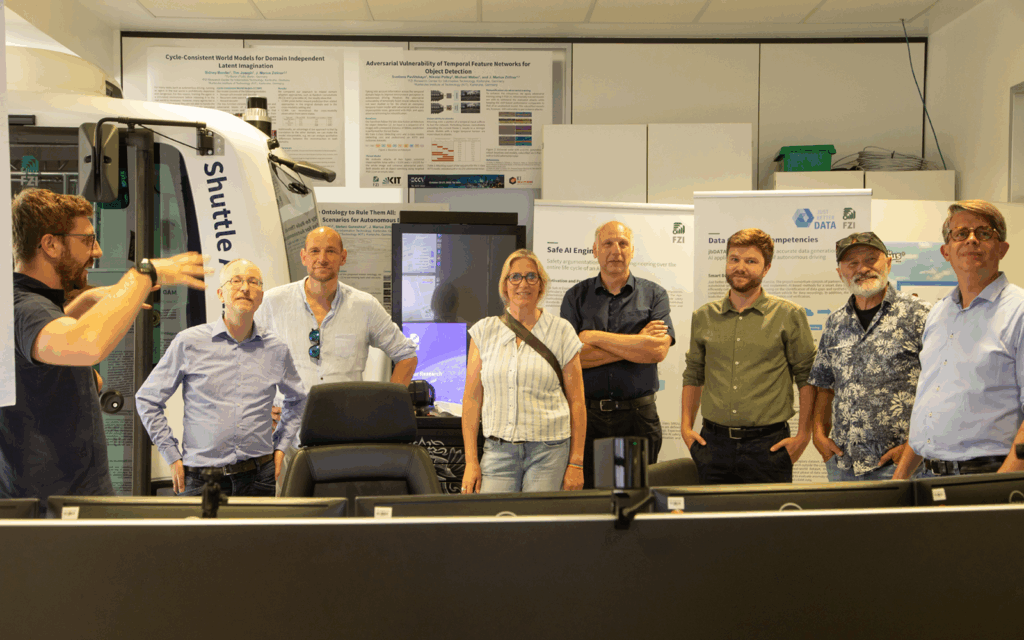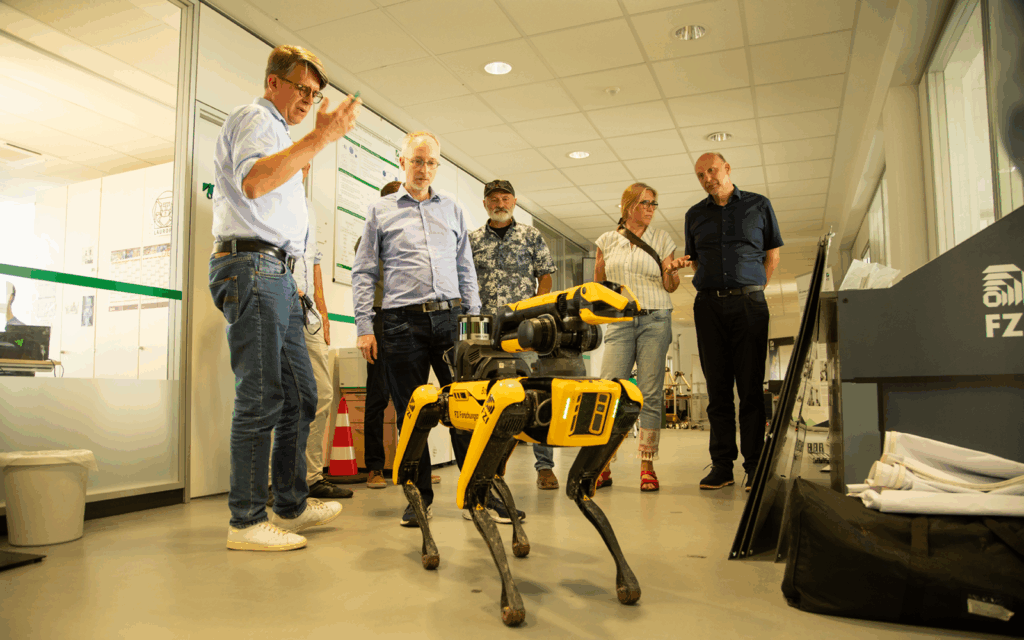Matthias Gastel Visits the FZI in Karlsruhe
Spotlight on the research into autonomous driving in public transport
Research Focus: Intelligent Transportation Systems and Logistics
How can autonomous vehicles make public transport in urban and rural areas more sustainable, flexible, and safe? Matthias Gastel, Member of the German Bundestag (Bündnis 90/Die Grünen), explored this question during a visit to the FZI Research Center for Information Technology in Karlsruhe. His visit focused on research into autonomous minibuses and their potential application in local public transport (ÖPNV).
Experiencing autonomous driving in a real-world laboratory
Matthias Gastel gained first-hand experience of the state-of-the-art technology on a ride with the FZI-Shuttle at the Test Area Autonomous Driving Baden-Württemberg. Daniel Grimm, Research Scientist at the FZI, explained: *The shuttle navigates using high-precision maps that define the possible driving area. Integrated sensors enable the vehicle to detect obstacles and other road users. Based on this information, the vehicle adjusts its route to the current traffic situation in real time. Continuously refining the methods developed in a real-world laboratory, such as the Test Area Autonomous Driving Baden-Württemberg, is a significant advantage for future mobility.”
Matthias Gastel emphasised the importance of this application-oriented research for the region and Germany: “I am impressed by how future technologies are being advanced here. We need autonomous shuttle buses, especially in rural areas, where they can be used for the first and last mile in conjunction with larger intercity buses and trains when passenger demand is low. These systems are also ideal for day trips and suburban locations in metropolitan areas. This will ensure mobility and address the shortage of drivers. As politicians, we must continue to develop the appropriate legal framework.”
Matthias Gastel, who is the transport policy spokesman for his parliamentary group in the Bundestag, was accompanied by Lutz Thielmann, Chairman of Bündnis 90/Die Grünen Durlach, and the Bündnis 90/Die Grünen Municipal Councillors of Karlsruhe, Dr Sonja Klingert and Christian Klinkhardt.
Research with impact: projects for tomorrow's mobility
Upon arrival at the FZI, Executive Directors Stefan Nickel and Jan Wiesenberger welcomed the guests. Scientists Stefan Orf and Julian Burger gave Matthias Gastel a comprehensive insight into the FZI’s current research topics in the field of mobility. In particular, the FZI presented three current or recently completed research projects with strong regional relevance in which autonomous shuttle vehicles are being tested and further developed:
In the pilot project EVA-Shuttle, which was successfully carried out in the Weiherfeld-Dammerstock district of Karlsruhe, automated, electrically powered minibuses were used in public spaces for the first time. The project was funded by the Federal Ministry of Transport (BMV). The findings still provide essential impetus for future mobility concepts in urban areas.
The Shuttle2X project, funded by the Federal Ministry for Economic Affairs and Energy (BMWE), is investigating how automated shuttle vehicles can be integrated more safely and efficiently into road traffic with the help of vehicle-to-X communication (V2X). Here, the exchange of information with traffic lights, other vehicles, and the infrastructure plays a central role. The tests are being carried out in the Karlsruhe area, among other places.
As part of the European flagship project SHOW – funded by the EU’s Horizon 2020 program – the FZI is working with partners in various European cities to test automated mobility services in real traffic. Karlsruhe is one of the model regions. The FZI is contributing its expertise in system integration and the operation of automated fleets.
Matthias Gastel’s visit once again highlighted the practical and future-oriented nature of the research conducted at the FZI, which aims to translate technologies such as autonomous driving into real mobility solutions for citizens.


About the FZI
The FZI Research Center for Information Technology, with headquarters in Karlsruhe and a branch office in Berlin, is a non-profit institution for information technology application research and technology transfer. It delivers the latest scientific findings in information technology to companies and public institutions and qualifies individuals for academic and business careers or the leap into self-employment. Supervised by professors from various faculties, the research groups at the FZI develop interdisciplinary concepts, software, hardware, and system solutions for their clients and implement the solutions found as prototypes. The FZI House of Living Labs provides a unique research environment for application research. The FZI is an innovation partner of the Karlsruhe Institute of Technology (KIT) and a strategic partner of the German Informatics Society (GI).
